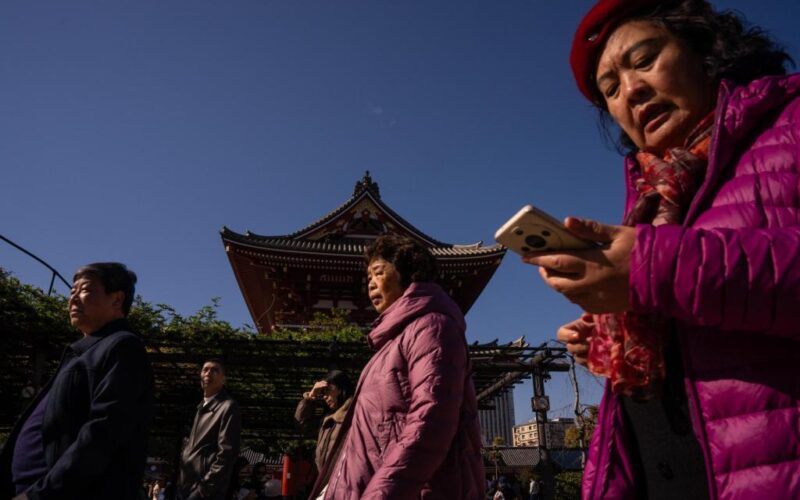By KEN MORITSUGU and AYAKA McGILL
BEIJING (AP) — Just days after China issued an advisory against traveling to Japan, the cancellations started.
About 3,000 Chinese visit Rie Takeda’s tearoom in an alley in Tokyo’s historic Asakusa district every year. Some 200 have already canceled bookings for her tea ceremony class, as far ahead as January.
“I just hope the Chinese tourists return by Chinese New Year,” she said, referring to the major holiday period in February. Past experience suggests it may take longer than that.
China’s government is turning to a well-used playbook to express its displeasure with Japan for refusing to retract a statement by its new prime minister on the hot-button issue of Taiwan.
As with its tariffs on Australian wines in 2020, and restrictions on Philippine banana imports in 2012, Beijing is using its economic clout to pressure Tokyo while also hurling a torrent of invective at its government. The only question is how far China will go and how long the measures will last.
“China’s countermeasures are all kept secret and will be rolled out one by one,” said Liu Jiangyong, an international relations professor at Tsinghua University in Beijing. “Everything is possible, because this involves the core of the nation’s core interests.”
Disputes can drag on for more than a year
China was angered by a statement of Japan’s Prime Minister Sanae Takaichi earlier this month that its military could get involved if China were to take action against Taiwan, the self-governing island that Beijing says must come under its rule.
Japan is trying to keep the feud from escalating but has shown no sign of backing down. That dovetails with how some other governments have reacted to China’s pressure: Stick to their positions and endure the pain, allowing the disputes to fester for a year or more.
“The diplomatic challenge for both sides is that they have their own domestic audiences and so they don’t want to be perceived as backing down,” said Sheila A. Smith, a senior fellow at the Council on Foreign Relations and author of “Intimate Rivals,” a book on Japan-China relations.
With several countries, the disputes persisted until a political change brought in a new leader unencumbered by the baggage of past statements.
Australia’s trade with China has gradually returned to normal since Prime Minister Anthony Albanese’s election in 2022 — the last step was the reopening of the lobster market. Canada is the latest country to start repairing relations under new Prime Minister Mark Carney.
The travel advisory starts to bite
It’s not the first time Japan has faced China’s economic wrath. In 2012, protesters attacked Japanese businesses in China and boycotted their goods after a dispute erupted over a group of uninhabited islands that both countries claim. Group tours to Japan were canceled.
Based on what happened then, when Chinese visitors fell by one-fourth, Nomura Research Institute economist Takahide Kiuchi has estimated the current travel advisory could cost Japan 1.8 trillion yen ($11.5 billion), knocking 0.3 percentage points off its already low annual economic growth.
Many group tours have been canceled again, hitting businesses that rely on them. Gamagori Hotel in central Japan’s Aichi prefecture said it had lost more than 2,000 guests. Nichu Syomu, a Japan-based tour company focusing on Chinese tourists, said 300 bookings have been canceled, describing the loss as comparable to 2012.
China had been on track this year to displace South Korea and return to its pre-pandemic position as the top source of tourists to Japan. More than 8 million Chinese visited in the first 10 months of this year, or 23% of the total, according to the Japan National Tourism Organization.
“It’s a shame,” Nichu Syomu tour operator Nana Enomoto said, noting Chinese tourism was just recovering.
Some Chinese tourists cancel. Others don’t
Kyren Zhu, who had never been to Japan, agonized over the decision. Her parents warned her against going. In the end, the accountant canceled a trip with a friend to see the fall foliage. Her friend went ahead and told her nothing unusual had happened.
“If I’d known, I probably would have just gone,” she said. “But it’s hard to say. The situation is really beyond our control.”
Beijing resident Livia Du, who opened a ski lodge last year in northern Japan, received two cancellations — but they were quickly filled by other Chinese.
One customer told her that since China had taken a clear stance, he had to align with it. Another works at a government-owned company and said that staff had been instructed not to visit Japan in the near term.
Guests appear to be in wait-and-see mode, said Du, who quit her job and invested more than 2 million yuan ($280,000) with her husband to build the lodge in Hokkaido. She was worried the situation could get worse.
China warns it may take further steps
The pressure appeared to extend into other sectors last week. The Chinese release of two Japanese movies was suddenly postponed — the comedy “Cells at Work!” and the animated feature “Crayon Shin-chan the Movie: Super Hot! The Spicy Kasukabe Dancers.”
A comedy festival in Shanghai canceled shows by a Japanese entertainment company, while a book publishing editor said her boss had told her to suspend a project to import a Japanese comic book.
The prospects for seafood exports to China remained unclear, even after Tokyo denied news reports that Beijing had said it was reversing its decision to end a 2-year-old ban on Japanese seafood.
Japan has failed to provide the technical documentation needed to resume the exports, Chinese Foreign Ministry spokesperson Mao Ning said when asked about the reports.
China could also target its export of rare earths, which are vital to car production and other industries. Beijing found that the minerals were an American weak point when it restricted their export earlier this year.
“Japan should first retract its erroneous remarks and take concrete actions to maintain the political foundation of China-Japan relations,” Mao said last week. “Otherwise, China will have to take further measures.”
McGill reported from Tokyo. Associated Press writer Fu Ting in Washington contributed to this report.











